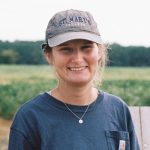2023 Rachel Carson Campus Fellows and Stanback Fellows Articles
How is Virginia Tech Doing on Sustainability?
12-12-23
Sustainability is big on campuses these days. A sustainable and environmentally conscious campus is one that incorporates environmental concerns into its policies, management, and research. But how does that work in practice? Let’s take a close look at how my own university, Virginia Tech is doing in five key areas: 1) Strengthening leadership commitments, 2) Building green engagement, 3) Developing and implementing sustainable curricula, 4) Integrated trash management, and 5) Developing environmentally friendly campus transportation. Read more
Rachel Carson and the Lure of Tidepools
12-05-23
My Uber pulled up to a little blue house on a cliff-side street, and I popped open the door to inhale the familiar West Coast perfume medley – forest fire smoke drifting in from the North, sweet eucalyptus, and a bit of fish.
I returned to the little blue house after Thanksgiving break, which I spent wrapped up by the fireplace with siblings and dogs in the cold humid jaws of Virginia. I had made it home just in time for the East Coast leaves to play the last song of their encore and was grateful to glimpse the fiery orange and bright yellow exit of autumn. Read more
Natural Gas: A Greenwashed Killer
12-07-23
Liquified natural gas is low-carbon, clean, responsible, and will transition the world to net zero emission. Or so says ExxonMobil, Chevron, Shell, fossil fuel companies and their supporters. The term “greenwashing” was first used by Jay Westerveld in 1986 to draw attention to misleading claims by the hotel industry to their customers; saving the environment was a false cover for promoting the reuse of towels when the primary motive was to cut costs. Now, as consumers become more drawn to eco-conscious products, greenwashing can be seen in labeling of products, advertisements, brand ambassadors, even where the product is being sold. Read more
The States Strike Back: How “Death Star Bills” Erode Local Autonomy
12-08-23
Not so long ago, in a state legislature not too far away, politicians began crafting bills to crush local authority. Dubbed “Death Star bills” by critics, these legislative maneuvers are wielded by state governments to override the laws of local communities with dissenting viewpoints. Many of these laws have been passed by Republican state legislators to thwart the more progressive policies passed by local Democratic officials. Death Star bills have encompassed a wide range of issues. Many, however, are focused on obstructing local legislation concerning environmental matters such as energy and land usage. The origins of such bills can be traced back several years. Read more
The One Health Approach is Key to Climate Justice
12-08-23
When I was in 6th grade, I suddenly became quite ill. Every movement was painful as I became too fatigued to take part in my typical schedule. It would take over a month before I got the diagnosis that I was positive for Lyme disease. By this point, the bacterium had already taken a destructive course in my body. I would find myself at the beginning of a journey of chronic health issues that continue to this day, eleven years later.
Lyme disease is a bacterial illness that can cause fever, fatigue, joint pain, and skin rash, as well as more serious joint and nervous system complications Read more
Are Campus Carbon Offsets Necessary?
12-08-23
In the dynamic context of climate change, the role of carbon offsets is both a potential solution and a controversial topic. My recent selection to American University’s carbon offset advisory board offers a unique vantage point. The role is not just an accolade; it represents a growing trend among American universities toward active involvement in environmental sustainability, particularly among the student body.
The commitment of American universities to sustainability and carbon neutrality is more than a trend; it’s a movement. These institutions recognize their unique position in tackling climate change. Universities are not just centers for learning and research; they are also microcosms of larger societal structures. Read more
Changing the Climate: The Hopes of Those Unseen and Unheard on Campus
12-08-23
It’s crazy to think that a year ago, I decided to embark on an experimental journey to see ways to transform my school to become a beacon of campus sustainability. As the newly elected Speaker Pro Tempore (SPT) of the Undergraduate Senate at American University, I’m standing at a crossroads of opportunity and responsibility. It’s not just a title; it’s a chance to make a real difference. I’m an openly gay, disabled, and low-income student at AU holding this position, and I carry with me not only hope for a better campus but also the hopes of those who’ve felt unheard and unseen.
I want to quickly talk about the role and how it changed for the first time this year. Read more
Karen Warren: Keeping the Legacy of Rachel Carson Alive Through Ecofeminism
11-30-23
As we advocate for continuing Rachel Carson’s legacy as contemporary environmentalists, it is essential to become familiar with the female environmental leaders who came after her time. One incredibly influential leader in the ecofeminist movement, or the examination of gender and the environment, is the environmental philosopher Karen Warren. An examination of her life and work can help each of us to be genuine torchbearers of Carson’s legacy and continue to keep feminism in our environmental action. Read more
When Climate Action Becomes Too Much: Mental Health, Climate Activism, and Community
11-30-23
College is already a pretty stressful place.
Seen as a period of transition, college students are often experiencing independence for the first time, becoming who they want to be in the world. However, this can be exhausting. Coupled with the effects of Covid-19, extreme social injustice and turmoil, and the constant threat of climate change, colleges are facing a mental health crisis. The National Education Association has said that rates of anxiety, depression, and suicidal ideation on college campuses have never been higher. Burnout is also common. According to the National College Health Assessment, 80% of college students have reported feeling overwhelmed and 40% reported it was difficult to function. Read more
Casting Away the Sins of Indifference: Reverse Tashlich and the Environmental, Spiritual New Year
11-30-23
“Let us cast away the sin of indifference so that we may be sensitive to the sufferings of others and responsive to the needs of our people everywhere.
Let us cast away the sins of pride and arrogance, so that we may worship God and serve his purpose in humility and truth.”
The Jewish calendar starts from the beginning every year in the fall. The new year is marked by a month full of holidays. The first two are marked by the theme of repentance and forgiveness. Rosh Hashanah, which literally means “Head of the Year,” is known as the day in which God remembers all of the actions which any human being has done in the past year and measures their merit. Read more
The Room Where It Happens: Unlocking the Power of Citizen Lobbying to Fight Fossil Fuels
11-17-23
When I first heard the term “lobbyist” in a high school government class, I instantly pictured older men in suits, roaming the halls of Congress with briefcases and nefarious intentions. It seemed that such people always worked for companies or industries trying to have undue influence over our congressional representatives, coaxing them into passing pro-industry or polluting policies. It wasn’t until I had been in the climate movement for a few years that I finally learned that “lobbying” did not require anyone to be a professional lobbyist. In fact, it could serve as an extremely useful tool for your cause or campaign! Read more
Hydrogen hub, what’s that?: Americans are being left out of the hydrogen conversation.
11-17-23
According to a recent survey conducted by Clean Hydrogen Partnership, of all the types of clean energy, people are least familiar with hydrogen. This poll, among others, has highlighted an important problem: despite hydrogen being a core tenant of the Biden administration’s clean energy plan, many people have no idea what it is. And, for those who have heard of it, hydrogen is commonly associated with explosions or the Hindenburg disaster.
This past summer, I worked alongside professors at Rice University and energy companies in Houston, Texas to better understand the perspectives of residents, NGOs, industries, and politicians toward hydrogen. While many individuals were aware of and understood how it worked, there was a surprising lack of knowledge regarding hydrogen, even among professionals and policymakers. While this may not seem like a big problem, it could have far- reaching consequences for the Biden administration and policymakers. Read more
A Case For Play
11-09-23
A six-foot wave rose out of the Pacific glass, sparkling blue against the bruised pink after-light of the October sunset. I had a half-second to gawk in awe (and a smidge of fear) before I took a deep breath and flipped my surfboard, hanging on to the rails from below like an upturned turtle. The turbulent whitewater spun me twice and yanked me back upright.
I shook the water from my ears and paddled out to the lineup. It was a fairly crowded sunset session, so I did my best to dodge dozens of neoprene-clad arms and legs that came flailing my way. The tide was low, the moon was rising full, and the waves were thick and lazy. It was a perfect day to play. Read more
The History and Power of Soul Food
11-02-23
This fall, a diverse group of community members gathered at the Lucy F. Simms center in Harrisonburg, Virginia to honor and celebrate Black cooks and chefs who serve the Shenandoah Valley with their soul food. The event was sponsored by The Shenandoah Valley Black Heritage Project, located in the historic Northeast Neighborhood of Harrisonburg, a nonprofit organization that has been collecting and preserving Black history in the Shenandoah Valley region for the past ten years. Read more
Empowering Student Governments: Catalysts for Sustainable Change in Universities
10-25-23
The successful implementation of sustainability initiatives, particularly on a substantial scale within a university, needs not only the concerted effort of individuals but also the strategic deployment of political influence. And on campuses, much of that influence is encapsulated within the world of the student government. Student governments primarily function as intermediaries between the student body and the administration. Nevertheless, a significant proportion of student governments is spent grappling with issues of dormancy or inefficiency. It is imperative to recognize the critical role that student governments can play in steering a university toward the fulfillment of its sustainable development goals. Read more
Death to the Fishes in the Deep Blue Sea, Joy to PSE
10-25-23
Washington State is one of the most beautiful places in the United States. Nestled in the greenery of old cedars and the world’s only temperate rainforest, lies the city of Tacoma. Tacoma is touted as great for retirees and has amazing views of the water and of majestic Mount Ranier. But digging into Tacoma’s history reveals a more complex story – one of injustices to Indigenous people and of modern corporate abuse.
About one hour south of Seattle, or two hours with traffic (a problem adding one more lane would surely solve), Tacoma is also known for its pungent smell. In fact, the scent of the city has been dubbed “the aroma of Tacoma.” The odor can be credited to a paper mill, rendering plant, and oil refinery. Read more
Advocating for Local Environmental Policy Doesn’t Have to be Scary
10-25-23
Despite a growing list of environmental concerns affecting communities across the country, there is a chronic shortage of legislation aimed at curbing and addressing these issues. At the federal level, partisan gridlock has stymied bipartisan solutions. Similarly, progress at the state level is slow, with many legislatures also obstructed by partisan politics. This has left issues—ranging from PFAS water contamination to inadequate flooding preparation—unattended to and local communities vulnerable to a host of consequences. In fact, recent Pew Research polls reveal the majority of Democrats, Republicans, and Independents all support greater environmental initiatives, from better resource protection to increased renewable energy production. Read more
The Intertwined Relationship Between Climate and Social Oppression
10-25-23
When thinking about racism and classism, we tend to imagine direct offenses against individuals because of their identities. However, oppression goes beyond “personal biases.” It is rooted in our economic system: the state protects some communities while others are left to die. The feminist theorist bell hooks has coined the term white supremacist capitalist patriarchy. It directly describes the interconnected institutionalization of the oppressive system in which we live. Read more
Ending the Campus Throwaway Culture
10-25-23
Moving into college is an exciting and essential part of the college experience, whether it’s your first time moving into a completely new place or you are a returning student excited to see your friends after a long summer. One aspect of moving in that excites many students, including me, is decorating your new room. And, if you are living in a house or apartment, also decorating common spaces. Every year in August and September, students empty local Walmarts of last-minute fans, mirrors, pillows, hangers, and more. In addition, the universities’ mail center has its busiest season, with thousands of Amazon packages crowding the student center. The result? Trash containers filled with empty boxes. Have you ever wondered where all these possessions go once the student graduates? Read more
Climate Injustice at (actually slightly above) Sea Level
10-24-23
On one of the last truly hot days of September, I found myself seated on the upper deck of a ferryboat as the Western Shore of Maryland slowly faded into the distance behind me. At the eastern horizon, I watched as trees slowly peeked out of the Bay’s white-capped-dotted waters, appearing at first like the masts of a strange green ship rising out of the foam. That ship soon grew houses, docks, and boats; I knew then that I had sighted our day’s destination – Smith Island, Maryland. However, while Smith Island appears to be rising out of the Bay, the opposite is true. Smith Island is slowly slipping beneath the waves. Read more
A Sustainable Diet is Not Just About the Food you Eat, but Also What You Do With the Food you Don’t Eat
10-24-23
My fellow volunteers and I were tasked with dissecting many smelly trash bags.
On an unnaturally hot April day last semester, I spent hours sorting trash under the grueling North Carolinian heat. Along with a cohort of approximately fifteen other students, we tasked ourselves with auditing each piece of Duke University’s dining trash for a day. We hauled countless bags of trash from all of Duke’s on-campus dining locations to a makeshift auditing station in our busy quad. There, we weighed the trash bags, audited 2,439 pieces of trash, and sorted them into their proper categories of recycling, trash, and compost. In the process, we measured how inaccurate the original sorting of the dining waste was. Read more
Embracing Your Climate Organizing Community
10-20-23
On September 17th, alongside over 75,000 activists, I marched down the streets of Manhattan in New York City demanding an end to the fossil fuel era. 70 of these activists were college climate and financial justice organizers I had just met the day before. In unison, we raised our voices, danced, and embraced the power of our collective strength.
Before we embarked on this monumental march through the heart of New York City, Fossil Free Research, an international coalition of student organizers dedicated to dismantling the fossil fuel industry’s grip on higher education, hosted a pre-march panel and community hour. During this hour, we shared our victories and setbacks, drawing parallels and absorbing lessons from campus climate movements across the world. Read more
Rooted in History, Branching into Activism: The Vanderbilt Divestment Movement
09-28-23
On November 13, 2022, the Vanderbilt University community was in mourning, not for a person, but for a tree. Vanderbilt’s Bicentennial Oak, estimated to be around 250 years old, fell on the evening of November 12. It was soon determined that the tree collapsed due to “age-related decay.” Saddened community members attended a candlelight vigil days later, laying flowers at the fallen tree and holding a 250-second moment of silence. Read more
Greenwashers: Stop Trying to Recruit Gen-Z
09-28-23
It’s 2023, and in this year alone, Shell has paid influencers to show themselves filling cars with gas, BP has dialed back on their climate pledge while simultaneously marketing net zero progress, and a $1 billion lawsuit was filed against Delta Airlines for misleading consumers with sustainability claims. While there has been a substantial increase in discussions around greenwashing in recent years, it’s important to note that there are other actors beyond corporations who are to blame for making false claims about sustainability. Read more
What the Frack? How Does Fracking Work and Why is it an Environmental Justice Issue?
09-28-23
Hydraulic fracturing, more commonly referred to as hydrofracturing, hydrofracking, or simply fracking, is a well-stimulation process used by fuel companies to increase the oil and/or natural gas flow to wells from petroleum-bearing rock formations. It is done in geologic layers with low permeability such as tight sandstone, shale, and certain coal beds where oil and natural gas are naturally found. Fracking is also used with tight subsurface formations and low permeability sediments to increase the vapor extraction of the soil in order to remedy sites that have already been fracked. Read more
Liquified Natural Gas (LNG): Clean or Climate Injustice
09-28-23
Across the country, divestment campaigns are fighting for universities, pension funds, and more to take their investments out of fossil fuels. As recently as earlier this month, activists at New York University won a decade-long fight to divest their university’s endowment from fossil fuel investments. But as these campaigns persist, it’s important to keep a close eye on the fossil fuel industry’s efforts to put profit over people. From coal mines to oil extraction and shale drilling, the fossil fuel industry has lived many lives. Read more
How Can I Reduce My Carbon Footprint?
09-28-23
In 2017, when I was a third-year student at college, I had the privilege of taking a course on climate change. This was a discussion course, but I had to read scientific research papers which was not something I enjoyed. Nevertheless, I knew I had to make up my mind to read articles to avoid myself getting confused during the discussion session. One particular week, we were asked to read about carbon footprints and I started liking readings more than ever before since I found that a carbon footprint can be applicable to our daily lives. Read more
Do Climate Conferences Matter?
09-28-23
The United Nations’ Climate Change Conference of the Parties (COP27) in Sharm Al-Sheik, Egypt was one of the most unifying moments in my year for engaging a diverse group of stakeholders, despite some of its flaws. I was fortunate enough to attend the first week of COP27 through the SustainUS delegation and meet youth, elders, activists, policymakers, business leaders, and more from all over the world. More than just listening to their perspective or work, I discussed, learned, and grew in my ways of thinking about what change looks like and what avenues are open to us to enact that progress. As someone who is currently not in school, the experience provided me a rare opportunity for intellectual engagement and introspection of theory but also immediate action and directly applicable practice. Read more
Divestment at Wellesley College?
09-28-23
Since 2021, when Wellesley College agreed to divest from fossil fuels, there has been only silence. When the Board of Trustees agreed to divest, most people thought of the issue as completed. Yet, because of the increase in oil prices around the globe, Wellesley’s exposure to fossil fuel investments has actually increased from $95 million to $115 million in Fiscal Year 2022. Although it says on the Wellesley website that exposure to fossil fuel investments is expected to decline over the next several years as existing investments fully liquidate, data has been hard to find, and clear communication has been lacking. And, when the data has been requested or found by students, it is clear that though Wellesley College’s Board of Trustees agreed to divest, that does not mean it is actually happening. Read more
Destruction and Resilience: Black Wall Street and Durham’s Struggle for Racial Justice and Food Security
09-28-23
Durham, North Carolina, is home to one of the most well-documented examples of a thriving, interconnected Black community in the twentieth-century American South. Named after the endless line of Black-owned businesses on West Parish Street, Durham’s Black Wall Street encapsulated the larger African-American community of Hayti, where residents could shop at Black-owned stores, worship in predominantly Black parishes, and apply for insurance from the nation’s first Black-owned insurance company, North Carolina Mutual Life Insurance Company. An integral part of Hayti’s success, and ultimately, its targeted destruction during Urban Renewal projects of the 1960s, was the success of its grocery stores and many restaurants.
Today, Durham’s history of local civil rights activism and its storied legacy of Black restaurants form a continuous tapestry that captures the state of food insecurity across North Carolina and the United States. Yet resilience stands out as a throughline in the local history of Black Wall Street: resilience in the face of racial discrimination, resilience in the face of urban renewal, and resilience during the COVID19 pandemic. Now, as Durham County gears up to tackle food insecurity, these same businesses have remained committed to supporting their community in the fight for food access and equity. Read more
A Realization of Tomorrow: An RCC Fellow Reflects on the NYC March to End Fossil Fuels
09-25-23
On September 17, I joined an estimated 75,000 activists in a climate march through the streets of New York City to end fossil fuels.
The morning of the March, I went to the gym at 7am for an arm workout, not realizing that my arms—not my legs—would soon be screaming in protest from four hours of waving a sign at the front of the Youth Hub.
I donned my Rachel Carson Council t-shirt, a pair of walking shoes, and an edgy nose ring—not realizing I would end up on the front page of the New York Times.
And I stuffed three granola bars into my bag—not realizing that I would scarf all of them down in one sitting at a 5 PM rally standing 3 feet away from Bill McKibben.
There was a lot that surprised me about the March, even as a frequent attendee of climate protests.
The most delightfully unexpected aspect of the March was that it felt like a festival. Read more
Ecology by a Different Sound: Reverberations of Injustice in a Rural Southern Town
09-19-23
In the opening of Silent Spring (1962), Rachel Carson tracks a sensory conundrum in a fictitious town located in the “heart of America.” She writes…
“There was a strange stillness. The birds for example – where had they gone? Many people spoke of them, puzzled and disturbed. The feeding stations in the backyards were deserted. The few birds seen everywhere were moribund; they trembled violently and could not fly. It was a spring without voices. On the mornings that had once throbbed with the dawn chorus of robins, catbirds, doves, jays, wrens, and scores of other bird voices there was now no sound; only silence lay over the fields and woods, and marsh.… This town does not actually exist, but it might easily have a thousand counterparts in America.… What has silenced the voices of spring…?”
The mythic town Carson warns us about might as well be Sampson County, North Carolina. She gives us an opportunity over 60 years later to imagine environmental advocacy through the reverberations, or lack thereof, of sound. Through her poeticism, Carson connects mysterious sensory happenings to a nefarious source of toxic contamination and asks us to tune our perceptions of nature to notice its nuanced indications of harm.
What cues can we take from the soundscapes of our environment? What do those cues indicate in terms of both environmental harm and social inequality? Read more
Pick up Other People’s Trash?
Why we should start picking up other people’s trash? (I know, I know, just bring gloves or hand sanitizer)
07-20-23
I was strolling along the National Mall with my friends and wanted to take a reflective photo of the Lincoln Memorial. As I crouched down to take a photo, plastic water bottles floating in the water filled my frame. I stood back up and snapped a photo. Though the thought of picking up the bottles popped up in my head, I let it go as soon as I saw the thick algae the bottles were covered with. So, my friends and I headed onwards, though a strange feeling remained with me.
That night, I repeatedly thought back on the bottles and how I should have just picked them up. Should I have picked them up with the algae and tossed them out? What if the algae was food for some fish? Should I have separated them from the algae? I hadn’t brought gloves or hand sanitizer, so it’d be unhygienic. I hadn’t planned on eating anytime soon, and I could stop by a restaurant to wash my hands. They probably had cleaners anyway, right? Read more
Train Rides: A Love Affair
07-20-23
I still remember my first visit to the central bus station in my hometown, Bangalore, India, known colloquially as Majestic, or Kempegowda Bus Stand, after the city’s founder. Bangalore is the capital of the state of Karnataka in southern India. With over 8 million residents it is the largest city in the state and third largest in the country. Majestic Bus Stand serves as its central hub for intra-city and inter-city bus services; it teems with buses throughout the day.
My first visit here was as a child, and I was immediately terrified at having to cross between its semicircular bays while those huge buses were moving! But after a few visits I realized that the drivers drove slowly and carefully, because everyone crossed the semicircular bays while those huge buses were moving. So, I got used to it and soon looked forward to my next bus trip. Read more
Offshore Wind and Whales: The Next Nationwide Misinformation Battle
07-19-23
In New Jersey, Republicans have found an unlikely cause to champion — whale conservation. Amidst recent reports of whale deaths along NJ’s coast, Republican legislators have pushed a narrative that places the blame on offshore wind development, calling for a moratorium on construction to protect vulnerable whale populations. In their justifications, they allege that Gov. Phil Murphy’s administration is pushing the projects forward without the proper environmental impact studies and claim that no investigations into whale deaths are being done. Read more
First Flight: Where the Hogs Are

 Lucy Goldman and Francesca Cetta
Lucy Goldman and Francesca Cetta
07-20-23
LG: With my coffee cup gripped firmly in one hand, I raised the other to block my eyes from the North Carolina sun streaming through the windshield. The clock on the dashboard read 6:15 am. When I accepted a Climate Justice Stanback Fellowship with the Rachel Carson Council (RCC), I never envisioned that it would send me six hours south of D.C. to Eastern North Carolina to investigate factory farms in the region. Nonetheless, I was excited for the opportunity to learn first-hand about these Concentrated Animal Feeding Operations (CAFOs). Even better, I didn’t have to go it alone. Read more
Book Review: Life in the Eerie Regions
Below the Edge of Darkness: A Memoir of Exploring Light and Life in the Deep Sea (Penguin Random House, 2021)
07-20-23
Though they lie far beyond the reach of sunlight, the depths of the ocean are anything but invariably dark. Instead, bioluminescent animals provide where nature cannot, creating a distinctive world of underwater light amidst the abysses and trenches that characterize the deep sea. This is the setting for Dr. Edith Widder’s Below the Edge of Darkness, a memoir chronicling a lifetime spent in these eerie regions. Inspired by a brief period of childhood blindness, Widder grew to become obsessed with the role that bioluminescence plays in the communication and operation of deep sea marine organisms. This reverence for the underwater world is palpable in Below the Edge of Darkness, with vivid descriptions that drag readers down to the depths alongside Widder, immersing them in an environment like no other. Read more
The Sacrificing of Florida for One Governor’s Political Future
07-21-23
In May, on a strangely warm but overcast day in Durham, North Carolina, I graduated from Duke University after four years of studying, meeting new people, and experiencing world-changing events. After listening to our commencement speaker, throwing our caps into the sky, and saying tearful goodbyes, I finished packing my apartment and began my drive home – to South Florida.
Traveling from North Carolina to Florida is accompanied by several changes. The car stops its ascent and descent of hills once you reach the Florida border, the humidity sticks to your skin, and the air stops smelling like forest. Instead, you sniff salty wind. But by the time I had re-acclimated to my childhood home, these changes were not the ones I most noticed most. Florida felt like an entirely different state than the one I had left four years previously, mostly because of its heightened social and political tensions and fears. Read more
The Decarbonization Dilemma
07-21-23
Last weekend, I boarded an Amtrak train in Union Station and took the efficient 2.5-hour train ride from Washington, DC to my hometown, Princeton, New Jersey. The trip is not known to be particularly scenic, and most commuters keep their eyes on their books or phones, with the exception of the occasional sunset view over the rivers that feed into the Chesapeake. What goes largely unnoticed are the multitude of fossil fuel power plants and electrical substations, a crucial component in the transmission and distribution of electricity to consumers, that sit unassumingly along the journey among low-income housing. These facilities and their associated infrastructure go undetected by most of us, silently delivering electricity to our homes and businesses, with consumers giving little thought to their existence. A longer look out the window, however, underscores the enduring legacy of fossil fuel consumption: a history of environmental exploitation and a disregard for marginalized communities. Read more
Campus Divestment Action with Teeth: A Novel and Simple Legal Strategy
07-15-23
In the decades-long fight against fossil fuels, activists have employed myriad approaches to spur institutional divestment from the industry. Fossil fuel investments are unethical and immoral, organizers have argued. They are politically reckless and financially irresponsible. This is all compelling and true. But recently, student organizers at some of the most prominent universities across the country have been putting a new strategy to work: a novel legal approach.
The Uniform Prudent Management of Institutional Funds Act (UPMIFA) is a state law that is in place in all states except Pennsylvania. Each one is nearly identical. UPMIFA is a law that governs how non-profit, tax-exempt institutions can handle their money and investments. Read more
Book Review – Trash: A Haunting Past, Present, and Future
07-14-23
Edward Humes, Garbology: Our Dirty Love Affair with Trash (Penguin Random House 2012)
As someone attuned to environmental issues, I knew trash was a problem. But Pulitzer Prize-winning journalist Edward Humes’ Garbology: Our Dirty Love Affair with Trash conveys the details and damages of the massive trash epidemic in the United States. Humes opens with countless telling trash statistics: Only the Great Wall of China and a giant landfill on Staten Island can be seen from space; each of us will leave behind 102 tons of trash at the end of our lives; the United States discards enough wood every year to heat 50 million homes for 20 years. Such shocking statements more than piqued my interest.
But mounds of facts and garbage beg the question: how did we get to this point? Waste, Humes contends, is an essential by-product of the American principles of capitalism, competition, and consumption. The United States, most notably in recent decades, has espoused the principle of “spending rather than saving our way to prosperity.” Read more
Book Review – We Are Still Part of This World
07-12-23
Leah Penniman, ed., Black Earth Wisdom (Harper Collins, 2023)
“We were alerted to Sandy’s arrival on our farm … when we heard a deafening and perplexing roar from the forest,” writes Leah Penniman, a Black Kreyol farmer from Soul Fire Farm in New York. “The powerful sound was coming from a newly formed ‘river’ cascading from the forest and headed right toward our crop fields.”
Penniman, who laid asleep alongside her husband that October night in 2012, hurried to hand her children shovels, then ran downstairs to dig a trench with her family to save the farm from the impending floods of Hurricane Sandy. After the storm, she would learn that not only had other farms nearby lost a majority of their topsoil, but that “elders and people of color [were] disproportionately adversely impacted.” Read more
Wetlands or Wastelands?
06-29-23
When I was a kid growing up in northeastern North Carolina, my grandmother took my brother and me on a few hikes across the forests and wetlands of the coastal plain. She’s a gifted birder with an enviable ability to detect a species from its call. What my brother and I lacked in outdoor knowledge we made up for in complaints. I remember us traveling in her bright red Toyota Echo, drinking from hot water bottles, and dreaming of air conditioning and ice cream and whatever else awaited us after our excursions. Still, my grandmother was determined to show us the wonders of nature. Read more
Possibilities and Perils for Duke’s New Climate Vice President
05-30-23
On May 5th, eight months after Duke University launched its Climate Commitment, the school announced that Dr. Toddi Steelman, former Stanback Dean of the Nicholas School of the Environment, was appointed as vice president and vice provost for climate and sustainability. She will lead the new Office of Climate and Sustainability starting in July. Steelman spoke to the importance of creating more space for the Climate Commitment, a university-wide initiative to find solutions that support climate change mitigation, sustainability, and resilience. Read more
For the Birds: Memory and Endangered Species
05-23-23
Holding a $2 hotdog and wearing a wool scarf and fedora bought from a street vendor, my 11-year-old self was perfectly equipped for April in New York City. My mom’s friend was taking me on a tour of the city, and we had just spent several hours gaping our way through the American Museum of Natural History (AMNH) where I was fascinated by the Leonard C. Sanford Hall of North American Birds. I was surrounded by realistic dioramas with birds in their natural habitat, including one by noted ornithologist Frank Chapman depicting large wading species threatened with extinction by hunters in Florida. Read more
You Had Nuclear War. We Have the Climate Crisis
All Generations Should Empathize with Climate-Anxious Youth
05-16-23
“There is a sacredness in tears. They are not the mark of weakness, but of power. They speak more eloquently than ten thousand tongues. They are the messengers of overwhelming grief, of deep contrition, and of unspeakable love.” – Washington Irving
“Do the students roll out nap mats and curl up in the fetal position with their blankies and pacifiers while listening to her lectures?”
This was just one media reaction to Professor Jennifer Atkinson at the University of Washington on the topic of climate grief: dealing with the anxiety and psychological effects that arise as we come face to face with climate change. Her students, meanwhile, filled every single seat in the class during registration.
Clearly, the concept of a class taught on coping with climate grief is too much for some to handle. But what’s braver than confronting grief and loss head-on, rather than burying it, next to your own head in the sand. Read more
Tulane Holds Environmental Summit
05-13-23
This spring, the Tulane University’s Undergraduate Assembly’s Sustainability and Divestment Committee (SDC) hosted the first ever Tulane Environmental Summit. The SDC sought strong collaboration between the wide range of campus environmental organizations pushing Tulane to become a more sustainable and environmentally just institution.
Some 30 representatives from organizations including the SDC, along with Sunrise Tulane, Green Club, Trash to Treasure, Earth Science Club, Wave Center for Policy and Enterprise, Food Recovery Network, Students Against Food Insecurity, Office of Sustainability, and Crawfest joined an open forum discussion for students to discuss how their organizations could work more closely to achieve their respective goals. Read more
All Hands on Deck: Citizen science and climate change?
04-27-23
The sun peeks over the horizon, just enough to toss lemon-colored rays blindingly in my face and illuminate exhales like puffs of smoke. After a moment of holding my breath, I catch the sound again. A twip twip and taw-wee, followed by tussling dry leaves. The bird I was hunting, the Eastern Towhee, emerges from the cane break, scratching sand on his peachy belly and dusting black feathers gray. Others join the sand bath, picking mites off one another and playfully nipping beaks. I mark the checklist on my phone — five more towhees for the day.
Like thousands of others across the US, I participate in a community science monitoring program called Audubon Climate Watch. Climate Watch is a program that enlists citizens to help monitor bird species sensitive to changes in climate across North America. Read more
North Carolina Hogs in Ecuador?
04-20-23
I arrived on campus a few days late, halfway through my pack of antibiotics, and jetlagged the morning after my flight to Quito, Ecuador. Universidad de San Francisco de Quito welcomed me nonetheless with open arms.
As I navigated the well-manicured gardens and river that runs through the Cumbaya campus, I pulled off my mask to soak up the smells of a country foreign to me. I was there to study Environmental Anthropology – a subfield of anthropology that focuses on the relationship between humans and their environment. The class was entirely in Spanish, and heavily focused on the indigenous peoples of Ecuador and the oil exploitation of the Amazon rainforest, which we would be fortunate enough to visit later in the summer. I was looking forward to learning from an indigenous person, and better understanding her take on the colonial epidemic of oil harvesting in Amazonia. Read more
Call for ESG Instead of Divestment?
04-20-23
In the face of a conflict of interest complaint, student pressure, and a legal complaint filed with the Tennessee Attorney General, Chancellor Daniel Diermeier of Vanderbilt University has resolutely maintained his stance of “principled neutrality” on divestment. According to his estimation, and many other university administrators across the country, divestment represents an activist position. It is perceived as a positive action a university takes, making a stand for a particular political position which may violate the ethical requirements of an ostensibly nonpartisan school. This charge of neutrality is used to justify inaction because, according to the logic of the argument, to choose divestment represents a deviation from what is acceptable from university administrations. Read more
Rachel Carson Country
03-22-23
The ocean is a place of paradoxes. It is the home of the hundred-foot blue whale, the largest animal that ever lived. It is also the home of living things so small that your two hands might scoop up as many of them as there are stars in the Milky Way. — Rachel Carson, “Undersea.”
For as long as my family has lived in Virginia, I have, as often as I can, committed to the windows-down, progressively flatter drive from Richmond to the sloping coasts of “Rachel Carson country.”
Sandbridge is the secret seed stuck between two well-known beach vacation front teeth. It is aptly named, a shifting connection sitting just south of the Norfolk naval bases and just north of the Outer Banks (OBX) of North Carolina, the sandbar beach strip that inspired a popular Netflix series mostly filmed in Charleston, SC. Depending on the season, observant beachgoers can spot hundreds of species of seabirds, sea turtles, ducks, dolphins, and, if you’re really lucky, whales. Read more
Can a Rachel Carson Introvert Succeed in the Climate Movement?
03-21-23
As much as I love climate advocacy, there have been several moments throughout my young adulthood when I have genuinely asked myself, did I pick the wrong career?
The question would pop up in unexpected places, such as protests, when I realized the only thing I dread more than climate change is being handed a megaphone to talk about climate change in front of a large crowd. It haunted me at conferences, when I hovered nervously by the food table or slipped off to an unoccupied hallway, desperate to recharge. Every frenzied happy hour I attended, every cameraless microphone-muted Zoom call, and every activist I guiltily dodged past on the sidewalk taught me a stark lesson: climate advocacy isn’t the most welcoming place for introverts. Read more
Is Divestment Enough? What About the Impact of a University on its Host City?
03-17-23
Student activists at universities have led the charge in the fossil fuel divestment movement. Divestment from high-profile institutions like Harvard and Columbia has grabbed headlines, and such divestment decisions are considered sign-posts of progress in the fight against fossil fuels as a means to combat the climate crisis. While divestment has received much attention, it is only part of the whole picture for climate justice movements as they relate to universities. It is important to consider universities’ relationships to their host cities and spaces, which extend far beyond one financial decision.
In his book In The Shadow of The Ivory Tower: How Universities Are Plundering Our Cities, author Davarian L. Baldwin writes, “There is no question that higher education institutions can deliver positive community outcomes for their cities. But a central question remains: what are the costs when colleges and universities exercise significant power over a city’s financial resources, policing priorities, labor relations, and land values?” Read more
A Campus Without Activists?
03-15-23
“What’s the activist culture like on your campus?” A question that knocked me off my feet. I racked my mind for an answer and came up empty-handed. I could think of a couple of one-time events, fads of their time, but no true culture that thrives, or even survives, on my campus. That’s an interesting position for Indiana State to be in, considering the astounding amount of social and political upheaval that has characterized the country recently. And that’s not to say attempts haven’t been made; outside of campus, there is a youth climate activism organization called “earTHlings” which has historically engaged in weekly Fridays for Future demonstrations. EarTHlings’ members are in the middle school and high school age range and have made potent efforts to connect with the student population on campus, but the student body hasn’t been substantially receptive or supportive. My conclusion about the lack of activism– even when it’s right in the community, extending its hand– is that there’s not the grit, organizational skills, or numbers at my university for an activist culture to persist. Read more
Where Will Your Campus Endowment Go in the Future?
03-09-23
Divestment is a hot topic in today’s social, political, and economic climate. Among RCC Fellows, and many environmental activists across college campuses, divestment is best known as a strategy to denounce and delegitimize the fossil fuel industry (among others) through dissolution of fossil fuel assets in an institution’s endowment. But an important component of divestment — and less frequently mentioned — is the process of reinvestment.
When advocating for divestment campaigns, it is essential to consider how an institution reinvests its funds: a plan for reinvestment should be developed as a core part of future investment policy and fiduciary responsibility. Frequently, this is considered the next step to be implemented after a divestment campaign; I consider reinvestment and sustainable investment to be essential, ongoing parts of any divestment campaign as they hold an institution accountable to divestment goals in the long-term. Read more
Tulane Needs a Sustainability and Divestment Committee
03-08-23
A Speech to the Tulane Undergraduate Assembly by Sahil Inaganti
Louisiana and Tulane are on the frontlines of climate change and environmental injustice.
Scientists agree that climate change is increasing the frequency and intensity of severe weather and our lived experience validates that. Since I have been at Tulane, there have been eight hurricanes that have either canceled or affected classes. Notably, Hurricane Ida which canceled in -person classes for an entire month.
In addition to severe weather, we have to deal with sea level rise that threatens to inundate coastal communities, oil spills from the offshore rigs in the Gulf of Mexico, and the pollution from the facilities that process oil and gas just upriver from here in Cancer Alley. Read more
Conversation and Collaboration: Student Voices are Helping Shape Duke’s Climate Commitment
03-07-23
On September 29th of last year, Duke University announced its Climate Commitment. In a 90-minute announcement, administrators, alumni, faculty, and graduate students discussed the importance of Duke to be truly committed to the future of the climate and Earth. Sitting in the audience in our large auditorium, surrounded by those I had previously worked with on environmental and sustainability projects, I grew excited to learn that Duke, the institution that had been my home for the previous three years, would be making a difference for the planet. Leading up to the announcement, there were weeks of advertising about an announcement that would shed light on what Duke was doing next. However, by the end of the 90-minutes, I still felt confused about what exactly my university’s commitments were. Read more
Does Climate Change Exacerbate Natural Disasters?
02-20-23
Earlier this winter, California bore the brunt of a devastating flood, taking the lives of over a dozen residents and costing the state upwards of a billion dollars. With the risk of a warming climate and its catastrophic impacts increasingly taking hold, experts predict that severe weather events like this one will only become more common. Yet, curiously, this storm was not caused by climate change. When we delve into the true nature of how rising global temperatures played a role in the natural disaster, we see the complexity of the impacts of the climate crisis. Read more
A Day at an Environmental Health Clinic: Why We Need More
02-21-23
Environmental health clinics are organizations that research, treat, and prevent local environmental health exposures. They address toxic environmental exposures to agents such as pesticides, lead, and carbon monoxide, which are all especially dangerous to children. Such exposures can lead to severe health conditions, including cancer, asthma, developmental problems, and other disorders. Pediatric Environmental Health Specialty Units (PEHSUs), an EPA-funded network of environmental health centers across the United States, feature healthcare workers with specialized knowledge of the risks, prevention, and treatment of exposures, as well as state resources.
PEHSUs serve ten regions throughout all 50 states, providing medical care, consults, and education on environmental health issues. PEHSUs work with all levels of education, including healthcare professionals, schools, and families. Read more
How I filed a legal complaint against my university. And why you should too.
02-19-23
Now, it may not seem obvious right away how an obscure financial law could help us avert the climate crisis, but bear with me. When I got to Vanderbilt, I knew immediately that I wanted to be involved with sustainability advocacy on campus— especially a campaign to demand that the university move away from investing in fossil fuels that are causing climate change. Months after I joined the campaign, one thing led to another, and we had taken on a new task— writing a legal complaint against our university with the help of some of the best environmental lawyers.
After months of research and writing, we had followed in the footsteps of activists at Harvard to write our very own legal complaint. Our legal argument centered on an obscure financial law that applies to non-profits, such as universities. The law— the Uniform Prudent Management of Funds Act, or UPMIFA for short— holds non-profits to a higher degree of responsibility as they invest some of their funds. Read more
Bathe in a Forest, Listen to the Grass
02-18-23
Lessons from Rachel Carson on reconnecting with the wonders around us.
At 8:00 a.m. rush hour, the bustle of cramped sidewalks mirrors my internal environment. Coupled with navigating new illness and the general feeling of decomposing, a hectic start to the semester has left me frayed. But today I head for a winding trail. The image of an abandoned grassy swath at the end is seductive and propels me through the smog.
I trek a hill of white-capped grass that glistens in sunlight. The ground sings with the crush of frost. At the summit, clear air fills me and the fragmented feeling drips away with the liquid streaming from my nose. Words from Rachel Carson’s Silent Spring come to mind:
“Those who contemplate the beauty of the earth find reserves of strength that will endure as long as life lasts. There is something infinitely healing in the repeated refrains of nature — the assurance that dawn comes after night, and spring after winter.” Read more
Taking on Industrial Goliaths: Why the “Impossible” Fight Against Wood Pellets Matters
01-25-23
Is it heroic to challenge the power and influence of corporate giants like Enviva and Drax? Or simply naïve?
Seeing the catchy phrase “Drax the Destroyer” printed on biomass protest signs across the world, I instantly envisioned the famous fictional character by the same name, a six-foot-four colossus from Marvel whose powers include enhanced strength, energy blasts, and a proclivity for battle.
But the protests really refer to the UK company Drax. Under the guise of “carbon neutrality,” it produces biomass, or wood pellets, to burn for energy. Woody biomass is often harvested from forests in the Southeastern United States, then shipped overseas to the UK, Europe and Asia to be burned, emitting more carbon dioxide than coal. Read more
Looking at Gentrification: Should Stories Count?
01-18-23
When first studying the scientific method, we learn about conducting an experiment to help support or eliminate a hypothesis. The experiment itself is said to provide supporting evidence that helps scientists, policymakers, entrepreneurs, and others make decisions. However, what qualifies as evidence can be arbitrary. When some look to science, they expect to see numbers and figures. But in other circumstances, according to Cornel West, stories and personal accounts can be just as valuable.
While researching how flooding from Hurricane Florence may have affected gentrification in New Hanover County, North Carolina, I have found that neither numerical evidence nor personal accounts alone can help explain the phenomenon. Both forms of evidence play different roles and offer a different perspective on the story. Studies have shown that in some circumstances, quantitative evidence may not be able to paint the full picture when studying a process (social, environmental, economic, etc.) that changes over time. In such a case, qualitative evidence or personal accounts and perspectives can provide the crucial details needed to find answers. Read more
Get the Picture? Climate Change Inequality in GIS
01-18-23
Geographic information systems (GIS) are used for viewing, analyzing, and displaying geographical data in visual form. GIS uses data that is attached to a particular location and has the advantage of improving decision making since details are mapped out and easier to understand. Other advantages include reduced project costs and increased efficiency, improved communication between involved organizations, and easy recordkeeping where the maps can also be edited.
In short, GIS allows people to view their surroundings in new ways and see the bigger picture of the geographical world. Thousands of organizations around the world use GIS to make maps that communicate their analysis and share their solutions. We humans can have difficulty understanding data spatially; GIS software seeks to bridge that gap. GIS can help group statistics together that we wouldn’t be able to understand without a larger perspective. Some of the questions that GIS can help solve through pictures could be: Where are low-income families moving to from Raleigh, North Carolina? How are wastewater treatment plants affecting water quality in Eastern North Carolina? Read more
Women as Farmers?
01-18-23
Caricatures of a farmer usually conjure up images of a white, strong, rural man. While almost 60% of farm owners in Maryland are male, and about 70% are white, these statistics paint an incomplete image of what a farmer in rural Maryland actually looks like. Unfortunately, we lack the idea of female, non-white, farmers partly because these groups did not have the resources to pass down their stories. John Mack Faragher writes in “History from the Inside-Out: Writing the History of Women in Rural America” that “Some rural women- Native Americans, Afro-Americans, Chicanas, Mexicans, Hispanics- have suffered a historical silence in direct relation to the social conditions that kept them nearly totally illiterate. Even among Euro-Americans, only a few country women left written records, for even white female illiteracy was commonplace until at least the second half of the nineteenth century.” Not only were women without the means to record their experiences, but many had to “Combine illiteracy with farm workloads that kept even ‘scribbling women’ too busy to write much, and cultural attitudes that consistently devalued women and their documents, and it is a wonder that we have any historical materials at all.” Read more

















































